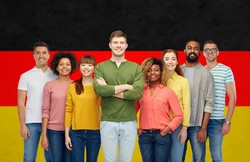The transformation of dual citizenship in Germany
Dual citizenship has become a main political issue in several European countries. This is due to shifts in migration, EU integration, and equalisation of rights between men and women. The TRANSFORNATION (Dual citizenship recognition and equal rights in Germany: Construction of a (trans)national form of citizenship in 21st century Europe) project took an ethnographic approach to the study of dual citizenship, combining it with a multidimensional model of EU immigration issues. This was the first time a comprehensive scientific and methodical study proposed an approach to dual citizenship by merging political anthropology of the state with ethnography of everyday life and subjectivities. The study considered how society transformed in a historical and political sense as well as the democratic configuration of German politics. It analysed discursive strategies and collective actions toward recognising dual citizenship. The examination of legal and administrative practices as well as the exploration of personal narratives was done to illustrate the ways in which gender, race and social class steer the function of dual citizenship. Certain political parties in Germany are opposed to the status of dual citizenship, and these parties are highly influential in the German parliamentary system. There is controversy involved that lies in the belief that persons of dual citizenship are suspected of dual allegiance. Despite the controversy, reforms of nationality laws were used as a tool for the integration of foreign nationals and their children. Additionally, rights between men and women were equalised regarding passing nationality on to children, leading to the recognition of dual citizenship for children of couples of different nationalities. TRANSFORNATION contributed to the sociological understanding of transnational forms of citizenship. It established the conditions of the emergence of a dual citizenship issue in Germany in the second half of the 20th century, and studied the administration of dual citizenship in the case of naturalisation. It also worked to understand the lived experiences of dual citizens by looking at the impact of a legal status on different aspects of social life. Achievements were realised regarding moments in the problematisation of dual citizenship issues, dual citizenship in the light of bureaucratic practices and the lived experiences of dual citizens. This lends to the consideration of dual citizenship as a complex and plural topic comprised of equal rights, recognition by national state and transnational politics. The study provides a means to understand how German citizenship is granted, how dual citizenship regulation is considered, and how it might be redefined or changed in the future.







